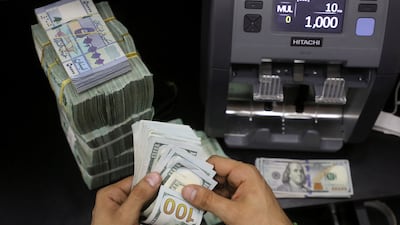Lebanon plans to drastically raise taxes to boost the cash-strapped state’s revenues, but experts fear that the Lebanese will not be able to pay the new rates after three years of economic collapse, which pushed more than three quarters of the population into poverty.
Lebanon’s public revenue fell by half in 2021 as the country grappled with a financial meltdown described as one of the world's worst economic crises.
The government currently generates taxes at the old pegged exchange rate, but Lebanon’s 2022 budget published on Tuesday introduced a new “effective rate" for taxes on salaries earned in dollars.
Finance Minister Youssef Khalil confirmed to The National on Monday that the new rate for taxes will be set according to Sayrafa, the official exchange rate platform managed by the Central Bank, where the Lebanese pound is trading at about 30,000 to the dollar.

This is about 20 times higher than the current official rate.
The local currency’s official rate had been set at 1,507 per dollar since 1997, before unravelling after the economic crisis unfolded in 2019.
“This is a skyrocketing increase. The budget includes a 25 per cent tax for annual incomes above 675 million Lebanese pounds, which is only $16,875 per year”, tax lawyer Karim Daher said.
The new rate for tax collection will be implemented once the Ministry of Finance and Central Bank issue a decree.
Legislators included higher tax brackets in the budget to alleviate the financial effect on taxpayers.
But experts fear the adjustment is not enough for an impoverished population grappling with one of the highest inflation rates in the world.
Lebanon is struggling with crumbling infrastructure and electricity and power cuts since the start of the crisis, which the population blames on years of corruption and mismanagement from its entrenched ruling elite.
“What are Lebanese getting in exchange for these taxes, in a country where the state provides almost no social protection”, Mr Daher said.
“How will they find the money to pay the extra taxes?”
Lebanese economist Jean Tawile said: “It will only drive informal labour in a country where the informal economy is already extremely prevalent." According to a 2012 World Bank report, half of the labour force works in informal jobs.
As a result of the measures, “tax evasion is going to increase, as the crisis is impacting the state's abilities to collect tax and enforce penalties in case of fraud”, Mr Tawile said.
A 2018 study estimated Lebanon’s fiscal evasion gap, mostly tied to income taxes, was $5 billion, the equivalent of 10 per cent of GDP.
Lebanon might generate even less revenue than expected in the new budget, which already forecasts a deficit of 10.89 trillion Lebanese pounds.
'A short-term fix'
The 2022 budget does not propose the required reforms for a more equitable, efficient and healthier tax policy, according to Mr Tawile, who said that “the tax system in Lebanon is extremely regressive and relies heavily on indirect taxes, which are imposed equally upon taxpayers, and not from direct taxation, which is fairer because it can be collected through a progressive scheme”.
In the absence of core reforms in tax policy, he said that Lebanese will see little difference in terms of social welfare. “It is a short-term fix to cover the increase in salaries for the inflated public sector, but it is far from addressing the country’s fiscal challenge.
“Tax hikes should be part of a set of comprehensive reforms,” he added.


